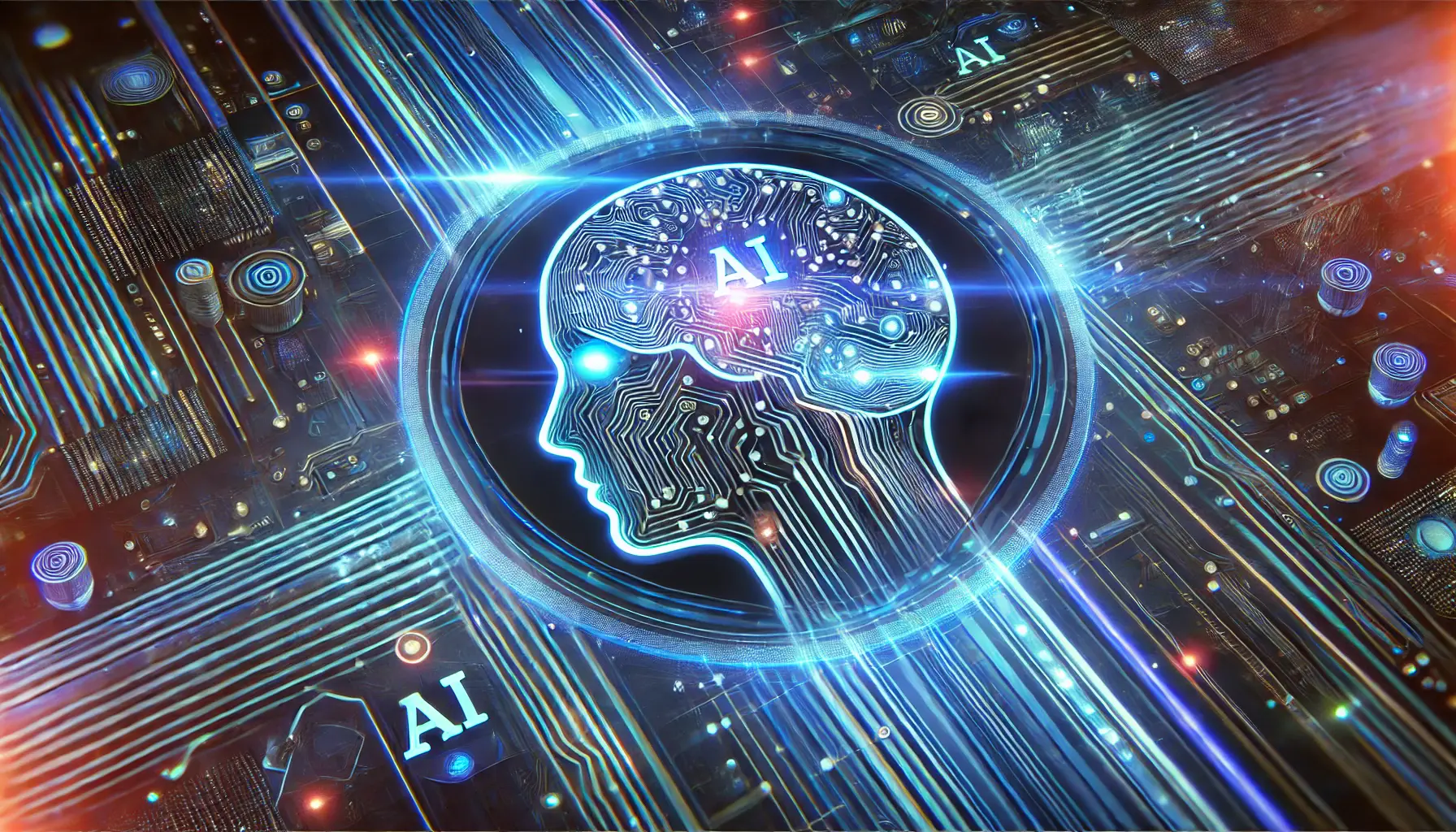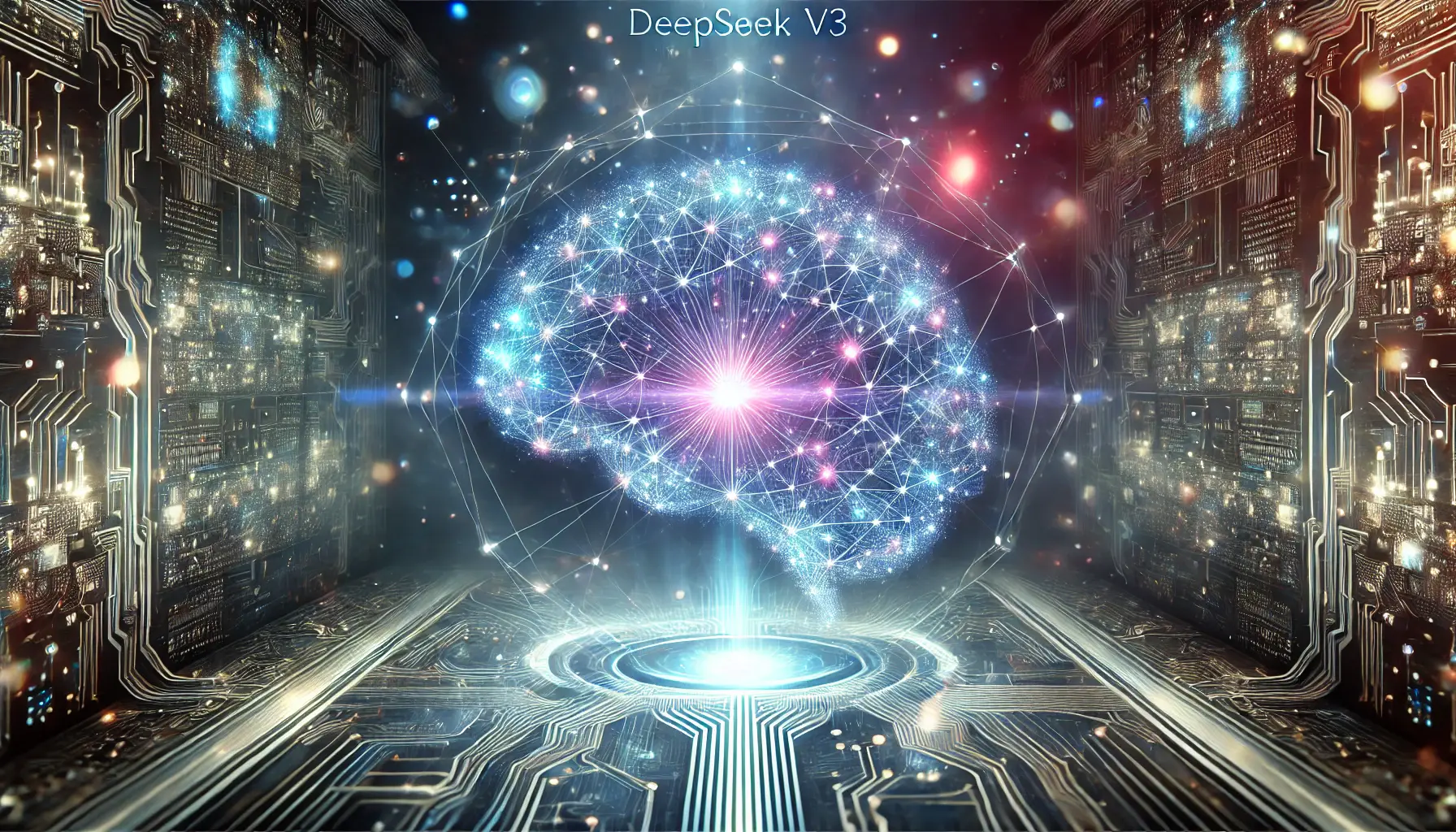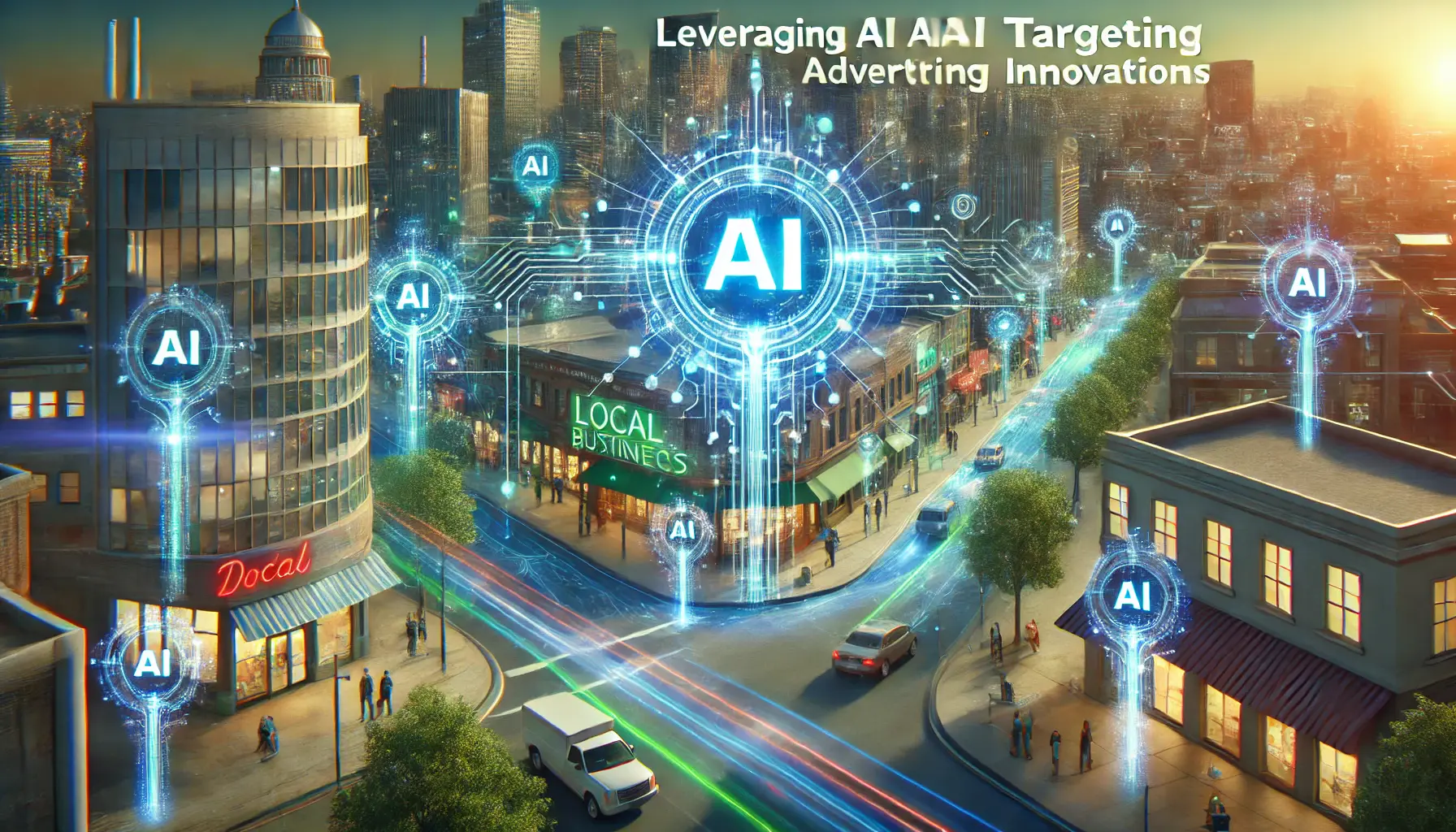Artificial Intelligence moves with amazing speed and continuously introduces breakthrough innovations into the world.
Among the most important recent releases in this sphere is DeepSeek R1.
At its core, this model holds very promising capabilities that make it a significant advancement in an industry expected to revolutionize many fields.
But what exactly is DeepSeek R1, and why is there so much buzz around it in the tech community?
Let’s explore its origins and significance.
Introduction to DeepSeek R1
DeepSeek R1 is an advanced AI model developed by the Chinese company DeepSeek.
Officially released on January 20, 2025, it has been praised for its exceptional performance in tasks such as logical inferenceThe process of making predictions or decisions based on trained AI models and input data., mathematical reasoning, and real-time problem-solving.
What’s particularly noteworthy is that DeepSeek R1 achieves performance comparable to leading models like OpenAI’s GPT-4, but at a fraction of the development cost and computational resources.
The founder of DeepSeek, Liang Wenfeng, led the development of DeepSeek R1 with a vision of creating a model that would not only match existing AI solutions but also surpass them in efficiency and accessibility.
By doing so, DeepSeek R1 has democratized access to advanced AI technology, enabling broader applications and fostering innovation across multiple sectors.
One of the standout features of DeepSeek R1 is its open-sourceA type of software or technology whose source code is freely available for modification and distribution. nature.
By making the model publicly available, DeepSeek has provided researchers, developers, and organizations worldwide with the opportunity to leverage and build upon this technology, accelerating progress in AI-driven applications.
In summary, DeepSeek R1 represents an unparalleled leap in AI performance, offering high efficiency, cost-effectiveness, and accessibility.
Its introduction marks a significant turning point in the AI industry, paving the way for future innovations and groundbreaking applications.
DeepSeek R1 democratizes AI by providing an open-source, cost-effective alternative to major models, making advanced AI accessible to more developers and organizations.
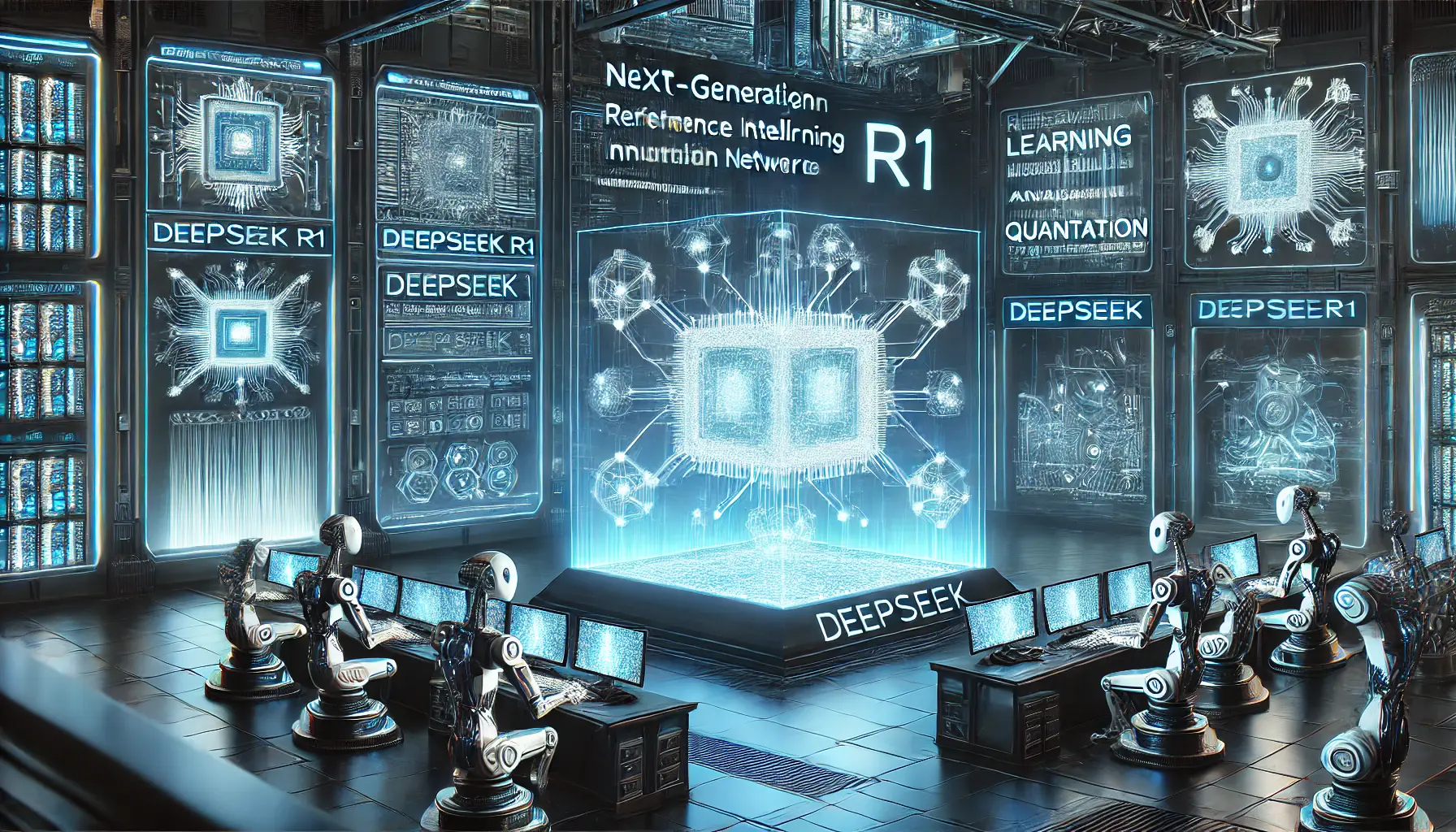
DeepSeek R1: Advancing AI with cutting-edge technical innovations in efficiency and problem-solving.
Technical Innovations in DeepSeek R1
DeepSeek R1 introduces several groundbreaking technical innovations that set it apart in the field of artificial intelligence.
These advancements not only enhance its performance but also make it more efficient and accessible for various applications.

DeepSeek R1: Advancing AI through reinforcement learning for improved problem-solving and adaptability.
Reinforcement Learning Methodologies
One of the key innovations in DeepSeek R1 is its use of reinforcement learning (RL) to improve reasoning capabilities.
Unlike traditional supervised learning, RL allows the model to learn by interacting with an environment and receiving feedback, enhancing its ability to handle complex tasks.
This approach enables DeepSeek R1 to achieve high performance with reduced computational resources.

DeepSeek R1: Advancing AI with energy-efficient processing and optimized computational power.
Efficiency in Resource Utilization
DeepSeek R1 was developed with a strong focus on resource efficiency.
By utilizing techniques such as quantizationA process in machine learning that reduces the precision of numerical representations to improve computational efficiency. and mixture-of-expertA machine learning architecture that routes different inputs to specialized models or experts to optimize efficiency. architectures, the model reduces the number of active parameters during processing, improving energy efficiency and decreasing computation times.
This optimization makes DeepSeek R1 more accessible for a wide range of applications and users.
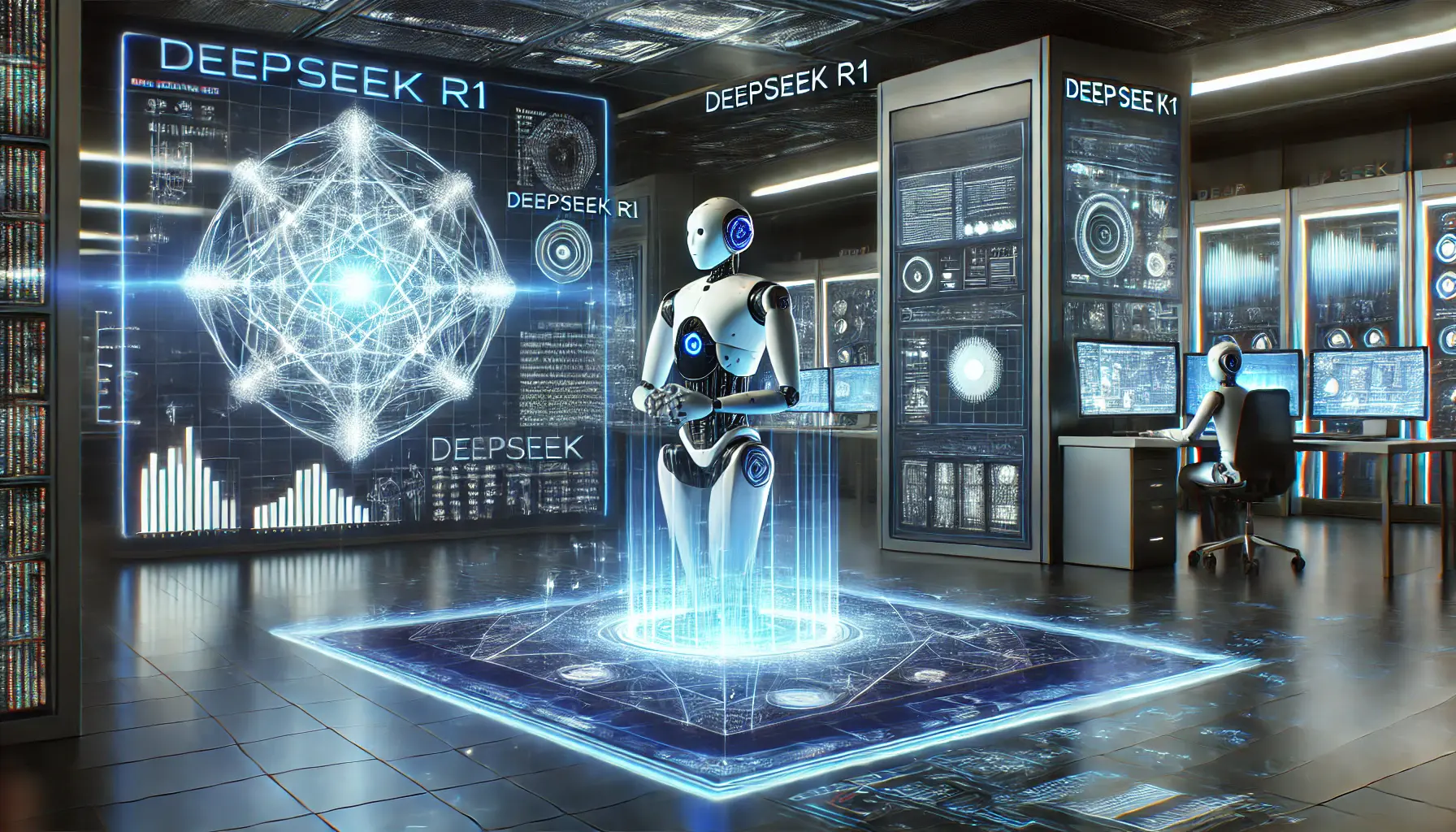
DeepSeek R1: Pushing the boundaries of AI-driven reasoning and problem-solving.
Advancements in Reasoning and Problem-Solving Capabilities
Advanced transformerA deep learning model architecture designed for handling sequential data, widely used in NLP and AI applications. architectures and training methods have been combined to create a model structure that significantly enhances reasoning and problem-solving abilities.
DeepSeek R1 outperforms many models in tasks involving logical inference and mathematical reasoning.
This makes it highly valuable for applications in scientific research, finance, and technology development.
Collectively, these technical innovations place DeepSeek R1 in a leading position within the AI landscape.
With its superior performance, efficiency, and advanced capabilities, this model is poised to drive the next wave of artificial intelligence advancements.
Reinforcement learning and efficiency-driven innovations make DeepSeek R1 a game-changer in AI, allowing high performance with reduced computational demand.
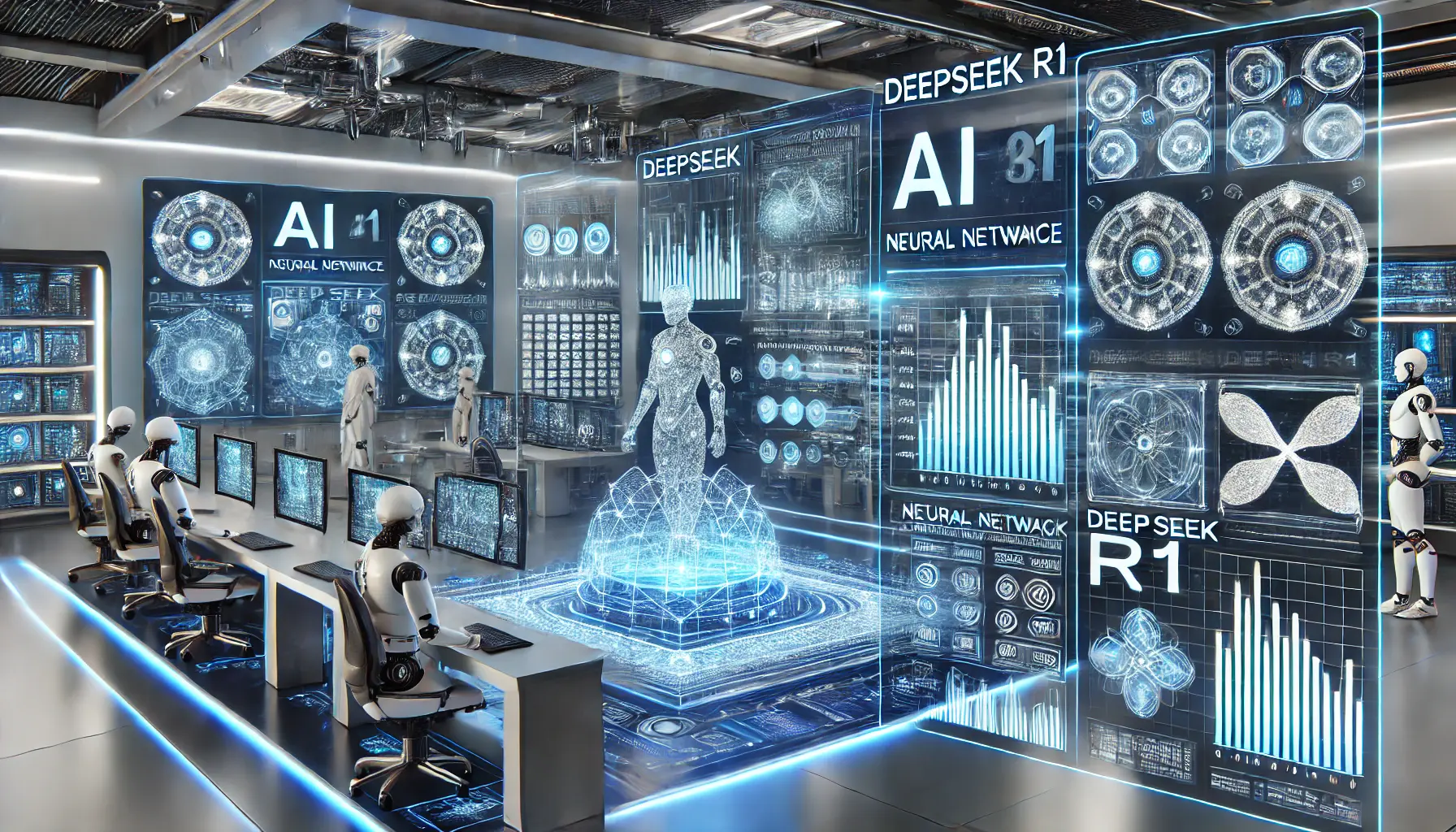
DeepSeek R1: Competing with top AI models in efficiency, reasoning, and performance.
Comparative Analysis: DeepSeek R1 vs. Other AI Models
In the rapidly evolving field of artificial intelligence, comparing models like DeepSeek R1 with other leading AI systems is essential to understand their relative strengths and applications.
Let’s delve into how DeepSeek R1 measures up against its counterparts in terms of performance, cost-effectiveness, and applicability.
Performance Benchmarks and Evaluations
When evaluating AI models, key performance indicators include accuracy, speed, and the ability to handle complex tasks.
DeepSeek R1 has demonstrated strong capabilities in these areas:
- Reasoning and Problem-Solving: DeepSeek R1 excels in logical inference and mathematical reasoning. It performs on par with leading models like OpenAI’s GPT-4o, making it ideal for applications that require high-level cognitive processing.
- Language Processing: The model effectively handles natural language understanding and generation, supporting tasks such as content creation and customer service interactions.
- Adaptability: Its architecture allows for efficient fine-tuning across various domains, enhancing its versatility in different industries.
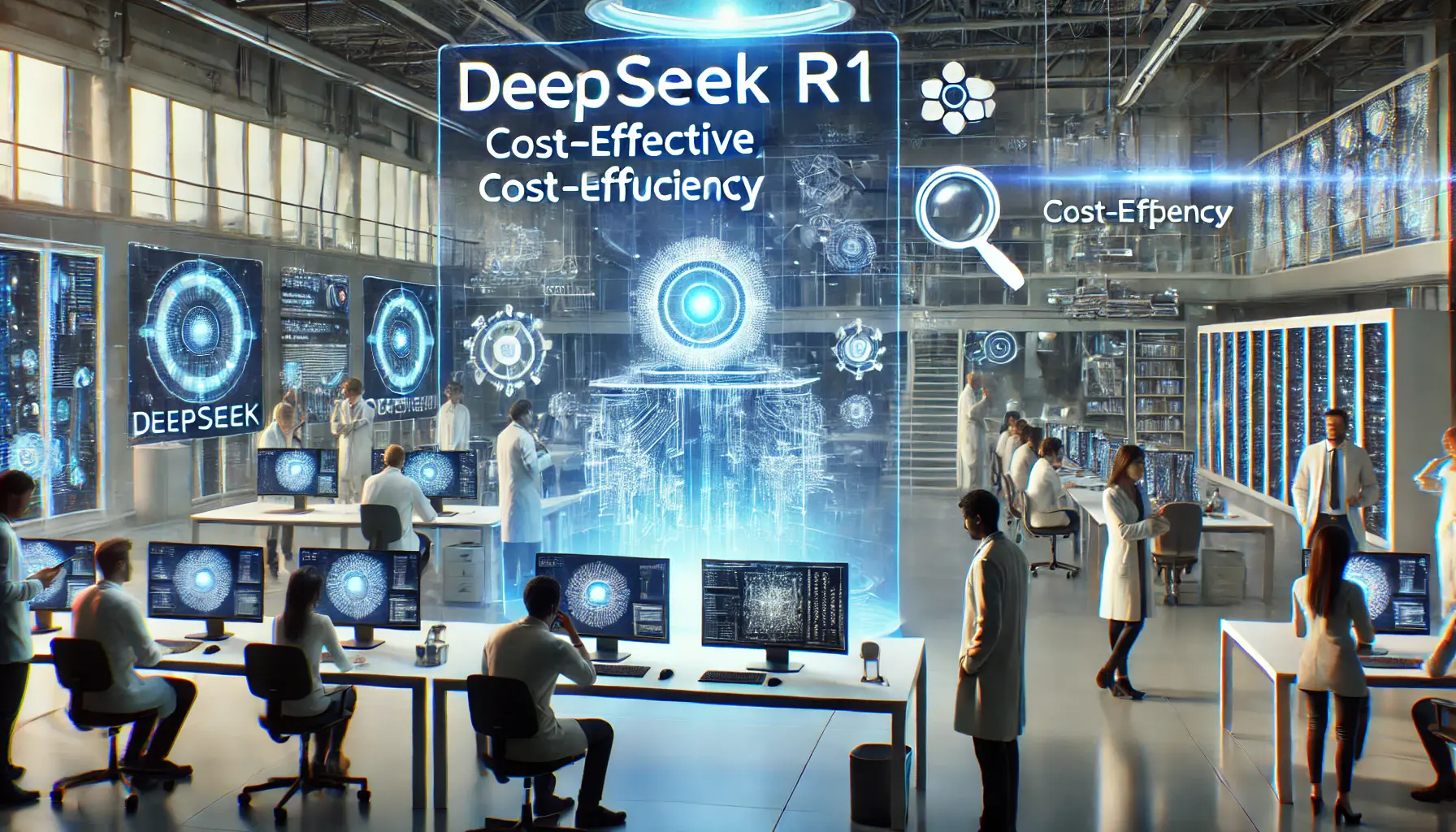
DeepSeek R1: Making advanced AI technology more accessible and cost-effective for a global audience.
Cost-Effectiveness and Accessibility
A significant advantage of DeepSeek R1 is its cost-effectiveness, which increases its accessibility to a broader range of users and organizations.
- Development Costs: Training DeepSeek R1 required around $6 million, significantly lower than the estimated $100 million for models such as GPT-4. This cost reduction lowers the barrier to entry for organizations seeking advanced AI solutions.
- Operational Efficiency: The model’s design prioritizes resource efficiency, leading to lower operational costs and reduced energy consumption during deployment.
- Open-Source Availability: As an open-source model, DeepSeek R1 encourages widespread adoption and collaborative development, fostering innovation within the AI community.
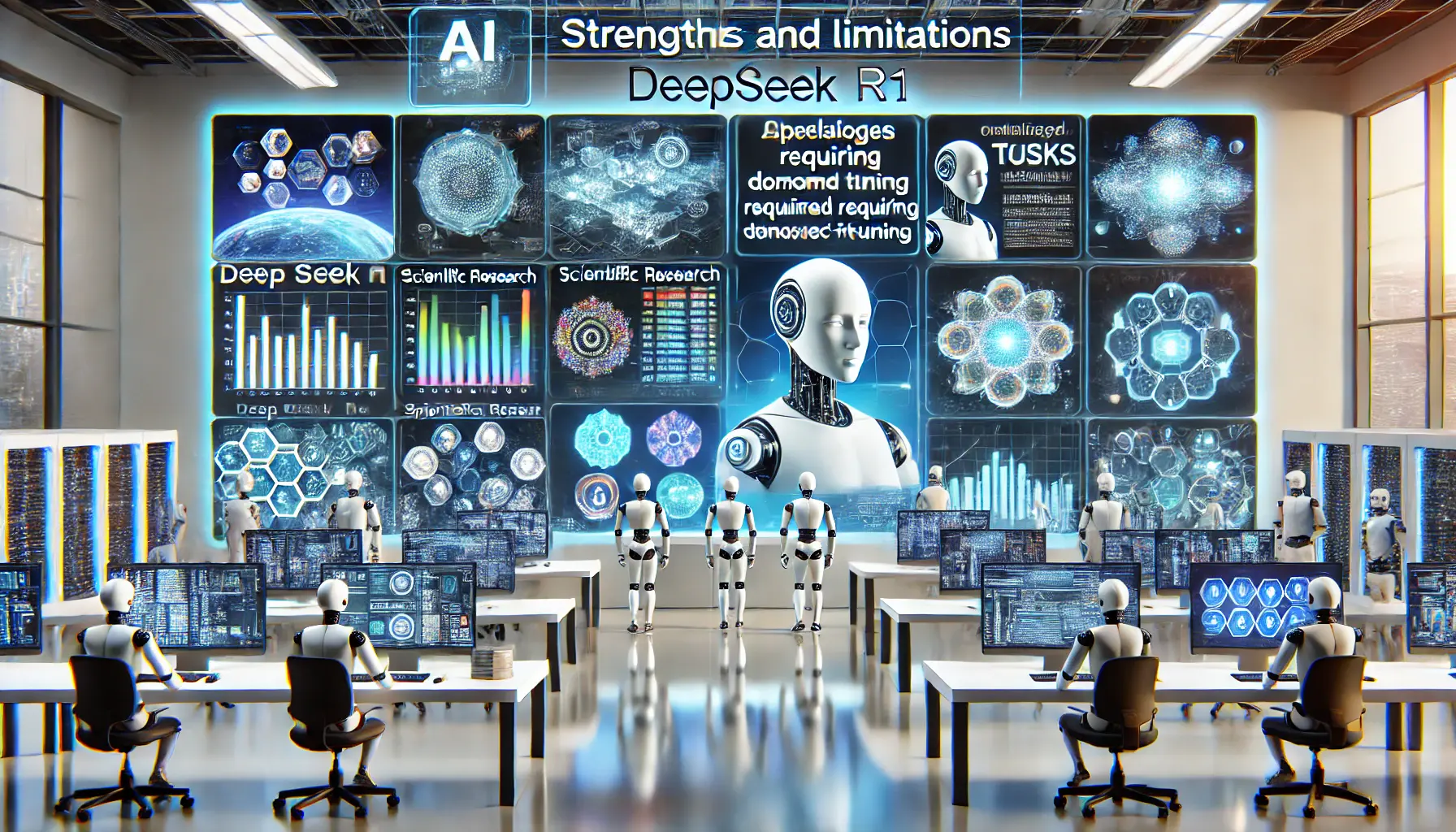
DeepSeek R1: Addressing both strengths and limitations across various AI applications.
Strengths and Limitations in Various Applications
Understanding the strengths and limitations of DeepSeek R1 is crucial for determining its best use cases.
- Strengths: Highly proficient in complex reasoning and problem-solving tasks. Cost-effective development and deployment, making it accessible to a wider audience. Open-source nature allows for customization and continuous improvement by the global AI community.
- Limitations: Potential challenges in handling highly specialized tasks without domain-specific fine-tuning. As with many AI models, substantial data may be required for optimal performance in niche applications.
In summary, DeepSeek R1 stands as a formidable contender in the AI landscape, offering a balanced mix of performance, efficiency, and accessibility.
Its comparative advantages make it a compelling choice for organizations aiming to leverage advanced AI capabilities without incurring prohibitive costs.
DeepSeek R1 rivals top-tier AI models while significantly reducing costs, making it a practical choice for businesses and researchers.

DeepSeek R1: Shaping the future of AI across the globe with widespread impact and collaboration.
Global Impact of DeepSeek R1
The release of DeepSeek R1 has sent ripples through the global technology landscape, influencing industry dynamics, eliciting varied reactions from tech communities, and shaping the future trajectory of artificial intelligence.

DeepSeek R1: Transforming the AI industry and driving innovation across diverse sectors.
Influence on the AI Industry and Market Dynamics
DeepSeek R1 has disrupted the AI sector by offering a high-performance, cost-effective alternative to existing models.
Its open-source nature and efficient design have democratized access to advanced AI capabilities, enabling a broader range of organizations to implement sophisticated AI solutions.
This shift challenges the dominance of established AI firms and fosters increased competition and innovation within the industry.

DeepSeek R1: Sparking diverse reactions and discussions within the global tech community.
Reactions from International Tech Communities
The international tech community has viewed DeepSeek R1 with a mixture of awe and concern.
Industry leaders have praised its remarkable performance and potential to drive AI innovation.
However, there is growing apprehension regarding the rapid pace at which AI capabilities are advancing and what this might mean for global competitiveness.
Discussions have emerged about the need for collaborative frameworks to ensure responsible development and deployment of such powerful technologies.

DeepSeek R1: Shaping the future of AI research and its potential for groundbreaking innovation.
Implications for Future AI Research and Development
The advent of DeepSeek R1 underscores the importance of efficiency and accessibility in AI research and development.
It highlights the potential for achieving high performance without exorbitant resource expenditure, encouraging researchers to explore innovative approaches that balance capability with sustainability.
This paradigm shift is likely to influence future AI projects, promoting designs that are both powerful and resource-efficient.
In summary, DeepSeek R1 has reshaped industry dynamics, sparked diverse reactions within the tech community, and set a high standard for future research and development in artificial intelligence.
By fostering competition and increasing AI accessibility, DeepSeek R1 challenges the dominance of established players and reshapes the AI landscape.
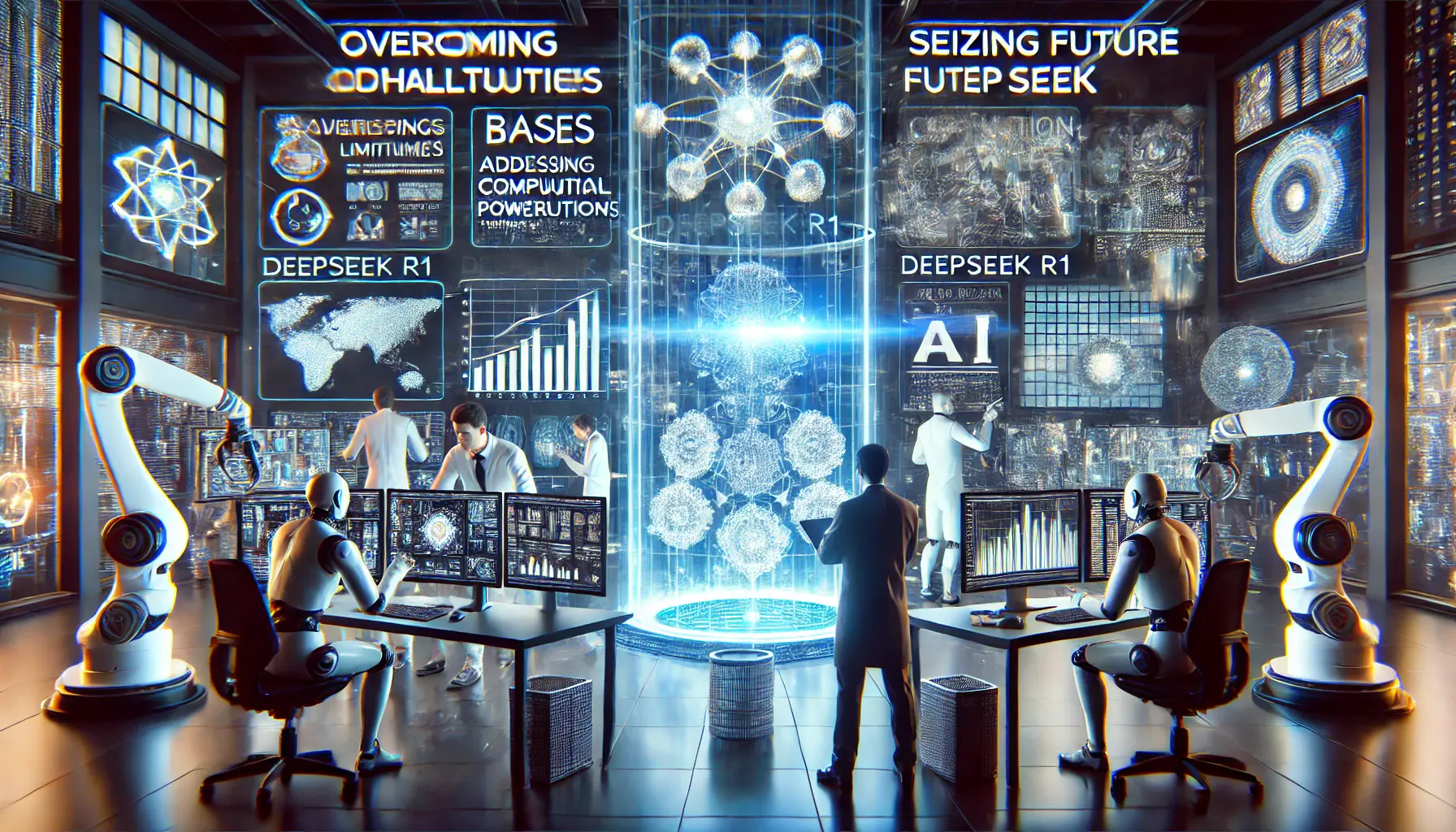
DeepSeek R1: Addressing challenges and optimizing future AI capabilities in a high-tech research environment.
Challenges and Future Prospects of DeepSeek R1
While DeepSeek R1 has made significant strides in artificial intelligence, it faces several challenges that could impact its future development and adoption.
Addressing these issues is crucial for the model’s continued success and integration into various applications.
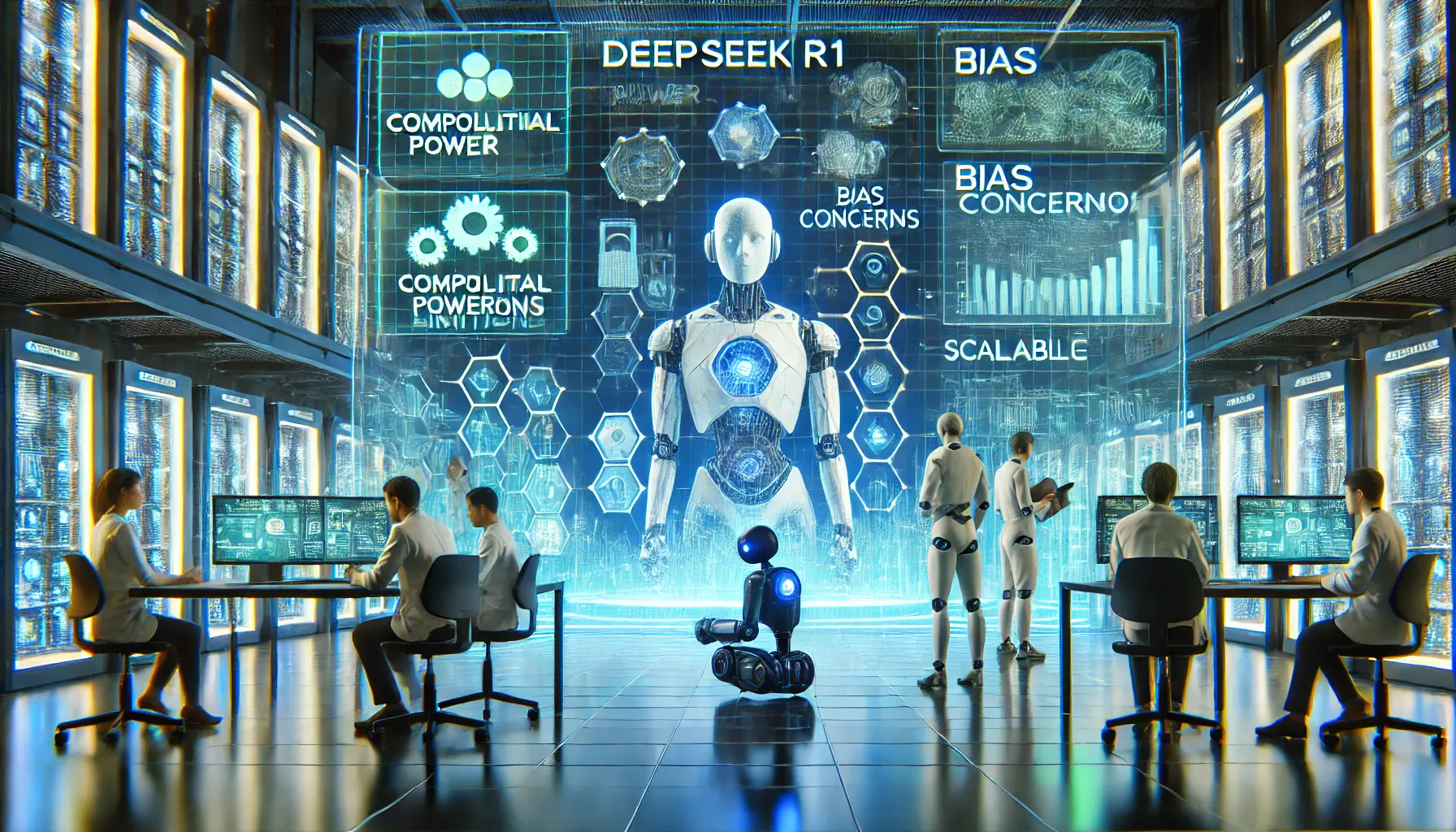
DeepSeek R1: Overcoming key challenges in AI development with advanced technology and collaboration.
Challenges Facing DeepSeek R1
- Compute Gap: Though designed for optimal resource utilization, DeepSeek R1 may face limitations in computational power compared to models developed by tech giants with vast resources. This could affect its ability to scale and perform complex tasks.
- Market Perception: As a product of a Chinese startup, DeepSeek R1 may encounter skepticism or bias in international markets. This could hinder its global adoption and opportunities for collaboration.
- Competitive Landscape: The AI industry is highly competitive, with numerous companies striving for dominance. DeepSeek R1 must innovate continuously to maintain its position and demonstrate clear advantages over existing models.
- Censorship and Bias: Concerns have been raised regarding DeepSeek R1 and potential biases linked to Chinese state propaganda. The lack of transparency in its training data and code has heightened apprehensions, especially in sensitive applications such as news dissemination.

DeepSeek R1: Unlocking new opportunities for AI advancement and innovation across industries.
Future Prospects and Opportunities
Despite these challenges, DeepSeek R1 holds promising prospects:
- Global Collaboration: By embracing open-source principles, DeepSeek R1 can foster international partnerships, encouraging collaborative development and knowledge sharing to enhance its capabilities.
- Resource Efficiency: With a strong emphasis on efficiency, DeepSeek R1 stands out as a model for sustainable AI development, appealing to organizations seeking to minimize environmental impact and operational costs.
- Democratization of AI: The open-source nature of DeepSeek R1 makes advanced AI technology accessible to a wide range of organizations and individuals, enabling them to develop innovative applications and drive breakthroughs across various fields.
In conclusion, despite the challenges, DeepSeek R1 has a bright future.
By addressing its obstacles and capitalizing on its strengths, it has the potential to continue leading advancements in artificial intelligence.
Despite its advantages, DeepSeek R1 faces challenges such as market biasA systematic error in AI models where certain inputs are unfairly favored or disadvantaged, often due to training data limitations., computational limitations, and concerns over transparency in AI development.
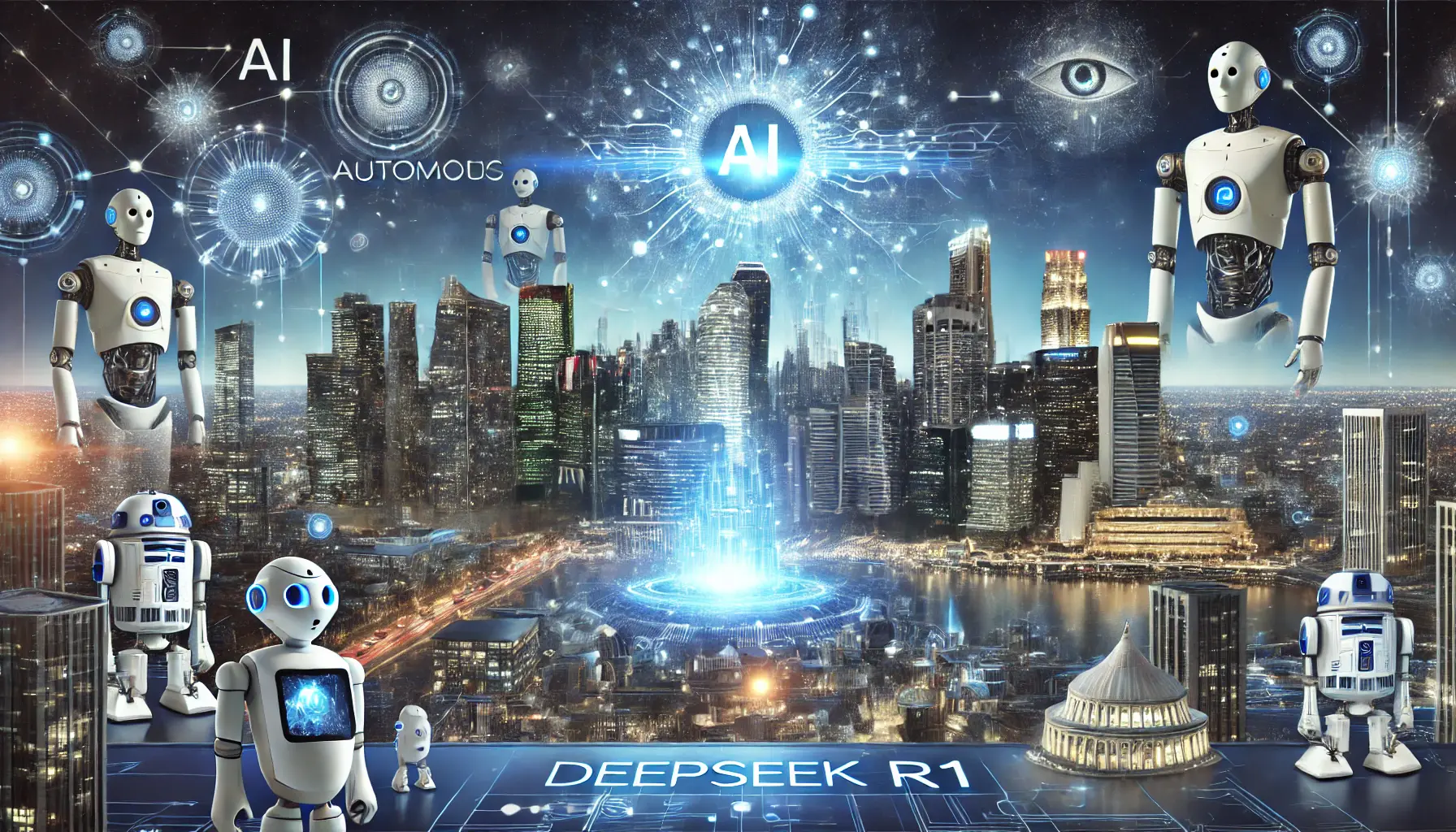
DeepSeek R1: Shaping the future of AI with transformative technology integrated into everyday life.
The Future of AI with DeepSeek R1
DeepSeek R1 has emerged as a transformative force in artificial intelligence, offering groundbreaking innovations, efficiency, and accessibility.
Its impact spans multiple industries, challenging existing AI models and redefining market dynamics.
As the AI landscape continues to evolve, DeepSeek R1 is set to play a crucial role in shaping the future of artificial intelligence.

DeepSeek R1: Exploring its core features and key innovations in AI technology.
Key Takeaways from DeepSeek R1
- Revolutionary AI Model: DeepSeek R1 combines reinforcement learning with optimized resource utilization to enhance reasoning and problem-solving capabilities.
- Competitive Performance: It performs at the same level or better than top-tier AI models while being more cost-effective and accessible.
- Global Influence: The model has sparked discussions across the AI industry, generating both excitement and concerns about its widespread adoption.
- Challenges and Opportunities: Despite concerns regarding computational power, market perception, and potential biases, DeepSeek R1 holds significant promise for future AI advancements.
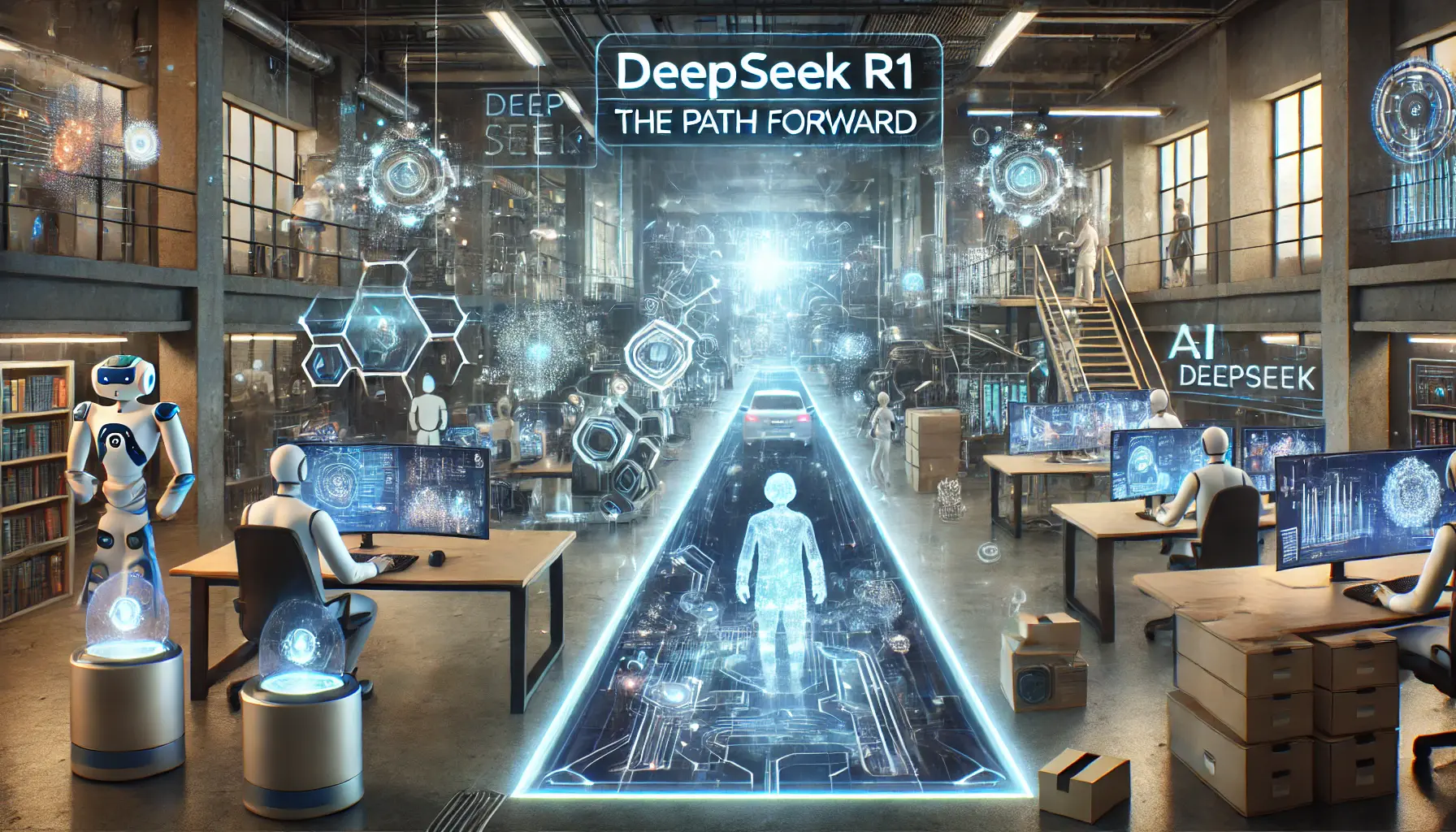
DeepSeek R1: Paving the way for future advancements and milestones in AI technology.
The Road Ahead for DeepSeek R1
Looking ahead, DeepSeek R1 has the potential to drive substantial progress in artificial intelligence.
By fostering global collaboration and continuous innovation, the model can overcome its challenges and further solidify its place in AI development.
- Increasing Access: With its open-source nature, DeepSeek R1 allows more developers, researchers, and businesses to harness AI across a broad array of fields.
- Enhanced Computational Efficiency: Continued improvements in processing power, combined with advanced machine learning techniques, will help the model scale effectively.
- Addressing Ethical and Bias Concerns: Greater transparency in training data and bias mitigation strategies will ensure responsible AI development and deployment.
As the demand for advanced and efficient AI systems continues to grow, DeepSeek R1 represents a new frontier in inclusive and innovative AI development.
By embracing its strengths and addressing its limitations, it holds great promise for transforming industries and pushing the boundaries of artificial intelligence.
DeepSeek R1 is set to drive AI evolution by enhancing accessibility, efficiency, and global collaboration in AI research and development.
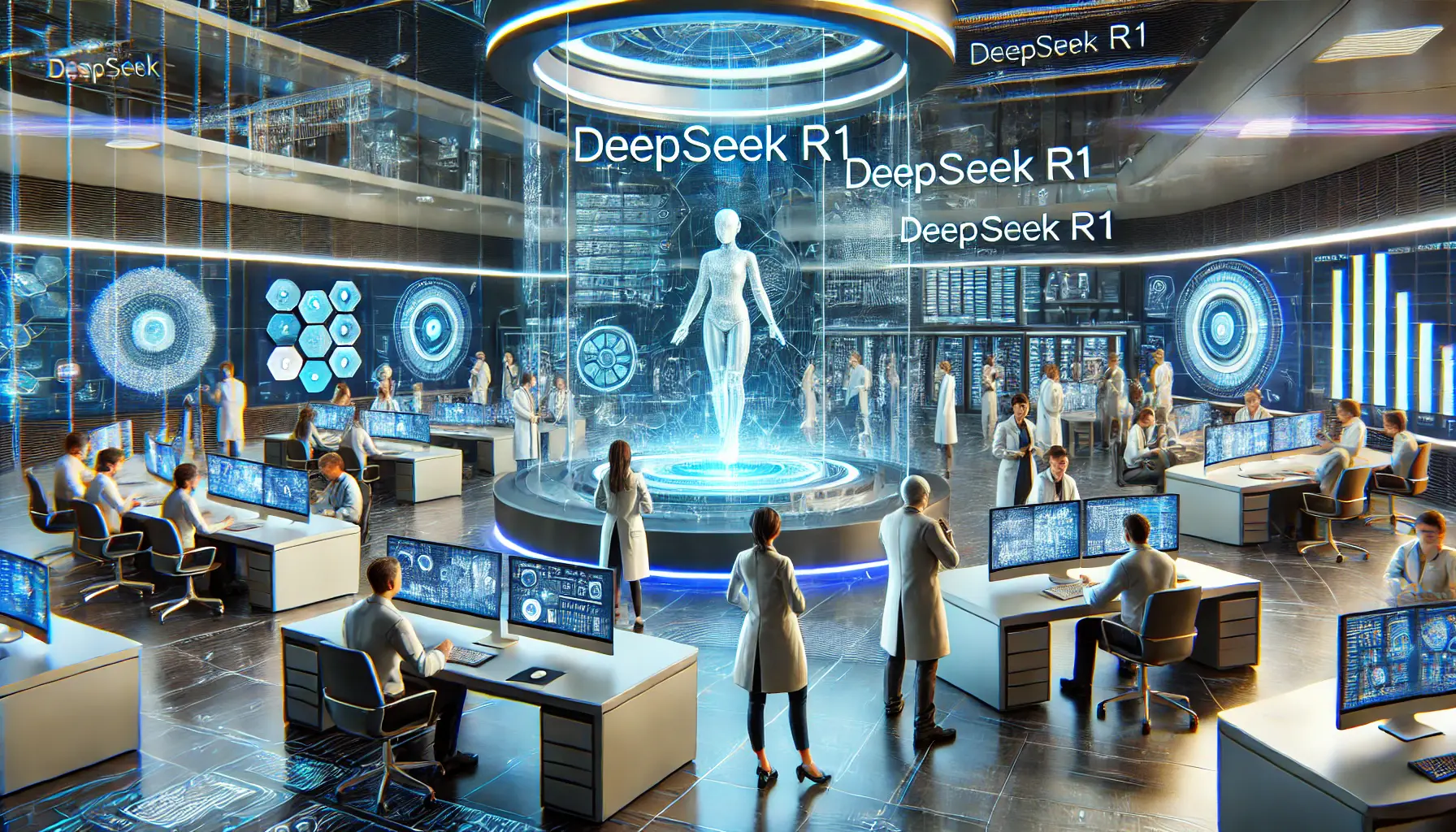
DeepSeek R1: Providing clarity and transparency through an advanced AI support system.
DeepSeek R1: Frequently Asked Questions
As DeepSeek R1 continues to influence the AI landscape, several common questions have emerged.
Below are concise answers to some of the most frequently asked questions about this innovative AI model.
DeepSeek R1 is an advanced AI model developed by DeepSeek, specializing in reasoning, mathematics, and coding tasks.
Unlike many AI models, DeepSeek R1 prioritizes efficient resource utilization and is open-source, enhancing accessibility for developers and researchers.
Yes, DeepSeek R1 is open-source, allowing developers and researchers to access, modify, and build upon its technology.
DeepSeek R1 excels in logical inference, mathematical problem-solving, and real-time AI-driven decision-making.
Developed by DeepSeek, DeepSeek R1 utilizes reinforcement learning methodologies to improve its reasoning capabilities and problem-solving skills.
Challenges include computational limitations, potential biases in data perception, and concerns about transparency in AI training.
The future of DeepSeek R1 includes global collaboration, enhanced resource efficiency, and greater accessibility in AI applications.
DeepSeek R1 challenges dominant AI models by promoting competition, driving innovation, and expanding AI accessibility.
Ethical concerns include data privacy risks, AI-generated biases, and the necessity for responsible AI governanceThe framework of policies and regulations that guide the ethical and responsible development of AI systems. and regulation.







